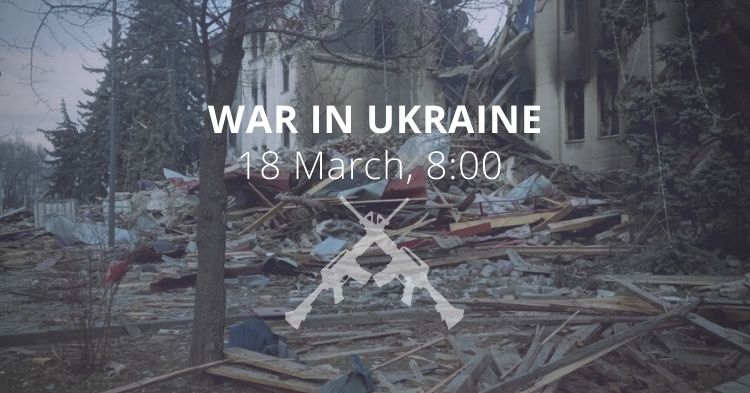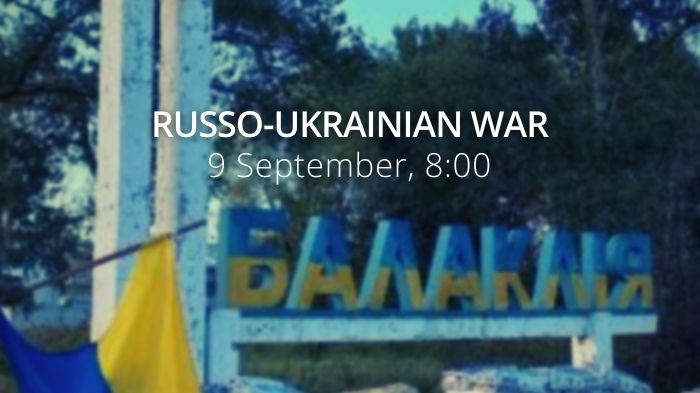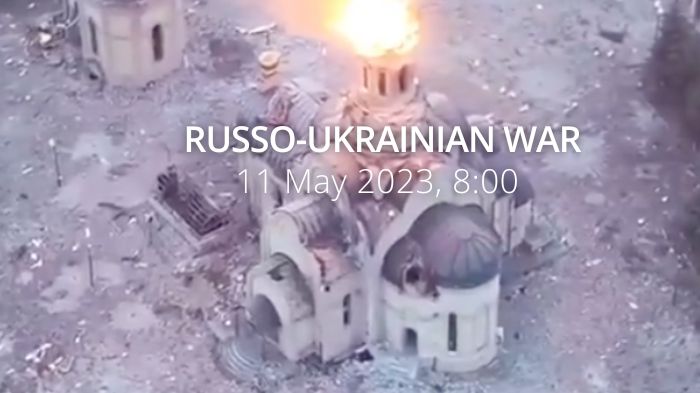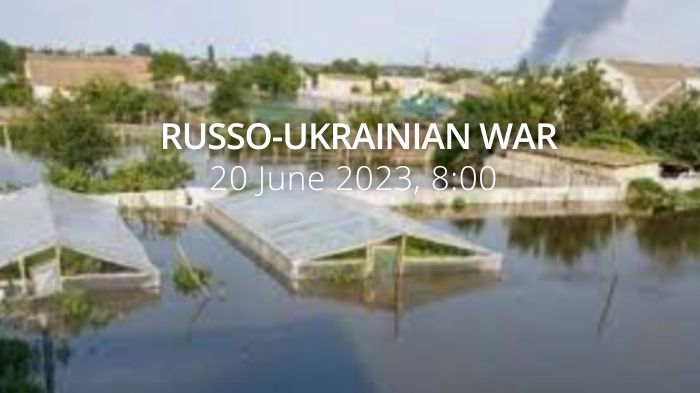Morning report day 23 - March 18
The report is based on media reports, expert analyses and official information posted online.
Situation
According to information from the General Staff as of 06.00 18.03.2022, supplemented by its [noon assessment]:
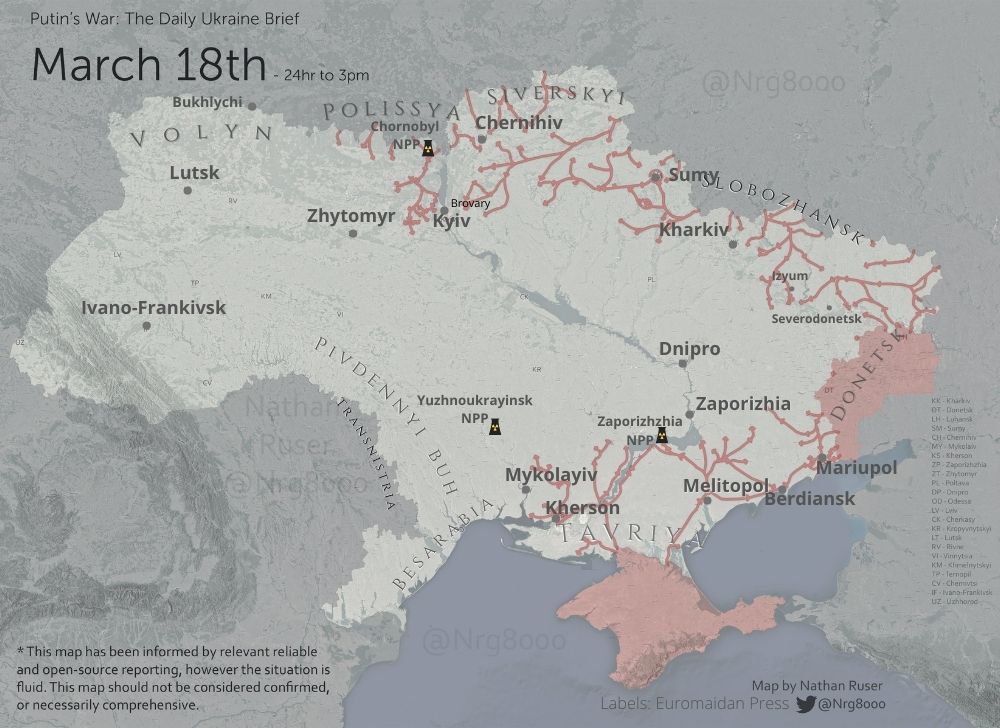
The state, position, and nature of the actions of the defence forces have not changed significantly during the last day. The Armed Forces of Ukraine continued to strike devastating blows at groups of enemy troops trying to consolidate and hold the captured defensive lines.
During the past 24hrs, Ukrainian defenders have partially destroyed and halted the advance of units of the 437th Training Regiment and the 26th Tank Regiment of the Armed Forces of the Russian Federation into Ukraine, and the enemy's losses are being clarified.
Also, for the previous day, bombing and assault aircraft of the Air Force of the Armed Forces of Ukraine inflicted heavy blows on the columns of enemy military equipment. Anti-aircraft missile forces and fighter jets hit 14 enemy air targets (7 planes, 1 helicopter, 3 UAVs and 3 cruise missiles).
[The enemy did not carry out offensive operations in the Volyn direction. He continued to strengthen the protection of the Ukrainian-Belarusian border by units of the Armed Forces of the Republic of Belarus. There is a high probability of provocations by the special services of the Russian Federation.]
[The enemy did not carry out active offensive operations in the Polissya direction, the main efforts of the occupiers were focused on maintaining the previously occupied borders and carrying out measures to prepare for a possible attack on Kyiv. At the same time, the losses inflicted on the occupiers by Ukrainian defenders, the low morale and psychological condition of privates and sergeants, as well as the lack of experienced commanders of tactical units make it impossible to resume offensive operations in the near future.]
[In the northern direction, the enemy is trying to stay on certain borders, restore the combat capability of units and replenish supplies. The occupiers continue to partially blockade and carry out artillery shelling of Chernihiv.]
[In the direction of Brovary, the enemy did not conduct active hostilities. In the area of the city of Brovary, the occupiers periodically carry out artillery shelling of the positions of the Armed Forces of Ukraine.]
[In the Slobozhansky direction, in order to resume offensive operations on the cities of Sumy and Kharkiv, the occupiers are trying to replenish stocks of ammunition and fuel and oil and are forced to use the accumulated human reserves prematurely. In the direction of the city of Izium, the enemy is trying to resume offensive operations.]
[In the Luhansk and Donetsk directions, the enemy focused its main efforts on preparing for the attack on Sievierodonetsk and the encirclement of Mariupol.]
[The enemy did not take active action in the Pivdennyi Buh directions. He moved on to the defence and engineering of the occupied frontiers. He tried to regroup and replenish stocks.]
[The occupiers continue to try to detect and destroy the air defence system along the Black Sea coast.]
[In the Black Sea, the enemy is trying to conduct demonstrations.]
The enemy continues to suffer losses. They have problems with providing units. The low morale and psychological condition of the personnel lead to an increase in the number of desertions and refusals of servicemen of the armed forces of the Russian Federation and mercenaries to take part in the war against Ukraine.
Because the occupiers have significantly exhausted human resources (irreversible and sanitary losses caused by units of the Armed Forces of Ukraine, cases of self-mutilation, to evade hostilities and psychogenic losses), the command of the armed forces of the Russian Federation is forced to extreme measures in matters of staffing. They are conducting covert mobilization, attracting so-called "volunteers", conscripts and cadets, as well as mercenaries from the Syrian Arab Republic.
[According to available information, the Russian occupiers have already picked up close to 1,000 volunteers from the so-called army of Bashar al-Assad and Hezbollah.]
[The main requirement for foreign fighters is the urban warfare experience. At the same time, according to available information, the above-mentioned militants do not intend to take part in hostilities on the territory of Ukraine, but to use "business trips" as opportunities to get to European countries.]
In some temporarily occupied territories, the Russian occupiers are trying to create a positive image by distributing food to the civilian population. At the same time, they are actively searching for and detaining pro-Ukrainian activists, civil servants, members of the Anti-Terrorist Operation / Joint Forces Operation and members of their families, as well as other citizens who may organize resistance to the occupation.”
A gif showing changes to the Russian forward line since the last update. I forgot to mention slight Ukrainian advances in Bucha town, Kyiv.
(I also forgot to show Lebedyn as under UA control in yesterday's map - so this isn't a genuine gain) pic.twitter.com/gUjSPnBOJQ— Nathan Ruser (@Nrg8000) March 18, 2022
According to British Defence Intelligence, (last 24 hours):
- Logistical problems continue to beset Russia's faltering invasion of Ukraine.
- Reluctance to manoeuvre cross-country, lack of control of the air and limited bridging capabilities are preventing Russia from effectively resupplying their forward troops with even basic essentials such as food and fuel.
- Incessant Ukrainian counterattacks are forcing Russia to divert large numbers of troops to defend their own supply lines. This is severely limiting Russia's offensive potential.
As of 18.03.2022 morning, the approximate losses of weapons and military equipment of the Russian Armed Forces from the beginning of the war to the present day:
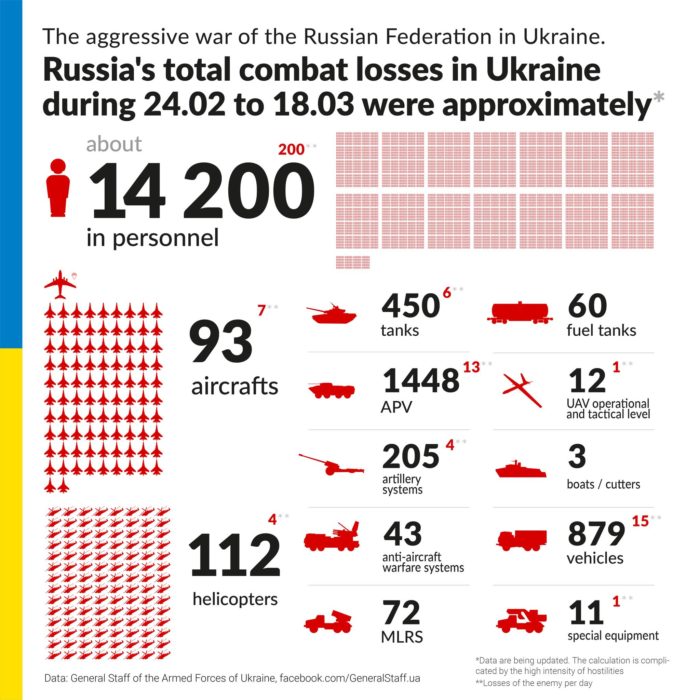
- personnel – more than 14,200 people (+200),
- tanks – 450 units (+10),
- armored combat vehicles – 1448 units (+13),
- artillery systems – 205 (+4),
- multiple rocket launchers – 72 (no change),
- air defence means – 43 (no change),
- aircraft - 93 (+7),
- helicopters - 112 (+4);
- automotive technology – 879 (+15),
- light speedboats - 3 units (no change),
- fuel and lubricant tanks – 60 (no change),
- UAV operational and tactical level – 12 (+1)
- Special equipment – 11 (+1).
I have previously referred to Oryx, which calculates and verifies losses based on open-source reports. The last time they were included in the report was 6 days ago. This update provides you both with their new assessment as well as changes since 12 March:
- Russia has lost at least 1506 (+396) vehicles and equipment so far, of which 698 (+240) have been destroyed, 24 (+10) damaged, 220 (+49) abandoned, and 563 (+96) captured.
- Ukraine has lost at least 373 (+70) vehicles and equipment until now, of which 143 (+28) have been destroyed, 5 (0) damaged, 48 (+3) abandoned, and 177 (+39) captured.
“The list only includes destroyed vehicles and equipment of which photo or video evidence is available. Therefore, the amount of equipment destroyed is significantly higher.”
Additionally, the Ukrainian Army had reported it had eliminated Sergei Sukharev, commander of an elite Parachute Regiment which had fought in Ukraien near Ilovaisk in 2014 and took part in the Chechen wars and Russian-Georgian war.
Ukraine's Army officially confirms it has liquidated Russian Colonel Sergei Sukharev, commander of the 331st Guards Parachute Regiment - @StratcomCentre
The regiment fought against Ukraine near Ilovaisk in 2014, took part in both Chechen wars & Russian-Georgian war in 2008 pic.twitter.com/9jFrCi6E8Y
— Euromaidan Press (@EuromaidanPress) March 18, 2022
Humanitarian
During the extraordinary meeting of the North Atlantic Council at the level of Defence Minister Ministers Wednesday 16 March, the Ukrainian Defence Minister, Oleksiy Reznikov, stressed that in the three weeks of the active phase of the war, Russian forces have already killed 103 Ukrainian children and maimed more than 100 more. About 3,000 civilians have been killed. The numbers are probably far higher, as Russia is committing a real act of genocide in Mariupol. Local authorities estimate the loss of civilians at about 20,000. This number is growing every minute.
https://twitter.com/EuromaidanPress/status/1504813120891596802
The UN says that so far Poland has taken in 1,916,445 refugees, Romania 491,409, Moldova 350,886, Hungary 282,611, Slovakia 228,844, Russia 168,858 and Belarus 2,127.
Legal
The General Staff of Ukraine reports:
- In violation of international humanitarian law, the Russian occupiers continue to take hostages and kill civilians, shoot civilians, obstruct the movement of humanitarian convoys to evacuate the population through defined and mutually agreed "green corridors", use civilian infrastructure for weapons and armaments. looting.
- The enemy continues to keep the Ukrainian city of Mariupol under siege and has moved to the total destruction of civilian infrastructure, housing and livelihoods, creating the preconditions for a deepening humanitarian crisis in the city.
https://twitter.com/EuromaidanPress/status/1504537412344684555 - In order to intimidate the civilian population in the temporarily occupied territories, the invaders abducted and detained representatives of state authorities and local self-government.
- In addition to units of the Russian armed forces in the Kherson region, police officers from the Krasnodar Territory and the Russian-occupied Crimea have been detained. FSB task forces perform punitive functions. The enemy is campaigning to involve the local population in the so-called "police".
The G7 Foreign Ministers demanded the Russian leadership immediately stop the assault on Ukraine, its population and civilian infrastructures, including hospitals and schools, and to immediately withdraw its military forces.
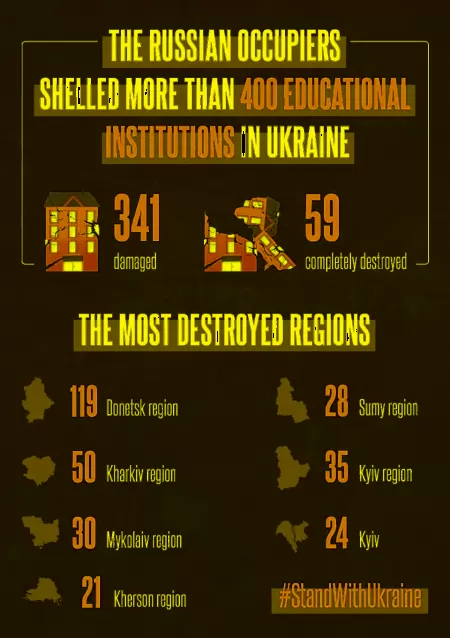
“The siege of Mariupol and other cities and the denial of humanitarian aid are unacceptable. Ministers demanded that Russia upholds its obligations under international humanitarian law and human rights law. The Russian leadership has to immediately provide for humanitarian access as well as humanitarian aid to be delivered to Mariupol and other besieged cities.
Ministers condemned in the strongest possible terms the indiscriminate attacks on civilians. Due to President Putin’s unprovoked and shameful war, millions are forced to flee their homes; the destruction of infrastructure, hospitals, theatres, and schools is ongoing. Russia’s blatant violation of international law has already isolated its government internationally and will further do so. The Ministers welcomed and supported the order on the provisional measures by the International Court of Justice, and strongly urged Russia to comply with the provisional measures order, which is binding on the parties.
Ministers underscored that those responsible for war crimes, including indiscriminate use of weapons against civilians, will be held responsible. Ministers welcomed the ongoing work to investigate and gather evidence, including by the Prosecutor of the International Criminal Court.”
Environmental
1. Energy
“The world is paying Russia $700 million a day for oil and $400 million for natural gas,” Oleg Ustenko, an economic adviser to the Ukrainian president, Volodymyr Zelenskyy, told The New Yorker this month. “You are paying all this money to a murderous leader who is still killing people in my country.”
One of the largest producers of fossil fuels in the world, Russia is highly dependent on its energy trade, with fossil fuels accounting for almost half of its exports and 28% of its federal budget in 2020, the New York Times reports.
“Unlike the United States, the European Union has not banned imports of Russian oil and gas, and it’s no secret why: Europe relies on Russia for about one-third of its oil and 40 percent of its natural gas. (The United States, by contrast, gets none of its natural gas and only about 3 percent of the oil it consumes from Russia.)
Germany is especially dependent on Russian fossil fuels; it is Europe’s largest energy consumer and Russia’s most important customer. That dependence deepened after the Fukushima nuclear meltdown, in 2011 when Angela Merkel committed to closing all of Germany’s nuclear plants.”
As the countries try to reduce their dependency on Russian oil and gas, experts fear the climate will suffer. In the New York Times article, experts argue that:
Fossil fuels — not renewable energy — end up filling the void. As energy prices soar, some fossil fuel executives have seized on the crisis as a business opportunity. At CERAWeek, an annual energy conference that was held in Houston this month, climate change was supposed to feature heavily. Instead, Kate
Aronoff reports for The New Republic, the focus shifted to increased domestic fossil fuel production.
Countries rethink their priorities. As politicians divert their attention to the invasion, investment in climate mitigation and adaptation could find themselves on the back burner, usurped by the perceived need for greater military spending. And militaries are highly energy-intensive: According to the Watson Institute for International and Public Affairs at Brown University, the Pentagon’s greenhouse gas emissions in 2017 exceeded those of entire industrialized countries, such as Sweden, Denmark and Portugal.
2. Transport
Shipping group Maersk still has vessels calling at Russian ports to deliver containers booked before the invasion of Ukraine began and to pick up around 50,000 containers stranded in Russia, gCaptain reports. Maersk has temporarily halted new container bookings to and from Russia, as a consequence of what the Kremlin calls a “special military operation” in Ukraine. “We have about 50,000 of our containers in Russia today. Most of them are empty, they are our property,” Chief Executive Soren Skou said. “We need them, and we are very reluctant to leave them in Russia. For this reason, we still have some port calls in Russia,” he said.
ABS withdraws Class services to Russian vessels, assets and companies, Tanker Operator reports. After careful consideration of the situation in Ukraine and the Black Sea as well as the applicable sanctions, ABS has decided to withdraw all Class services involving Russian vessels, assets and companies.
As the war continues to rage in Ukraine, impacts of rising food prices and shortages of staple crops are already being felt in the Near East and North Africa region and spreading to the world’s most vulnerable countries, including in the Horn of Africa, with the poorest people at greatest risk, warned the UN’s International Fund for Agricultural Development (IFAD) Friday 17 March. This comes amidst mounting concerns by the international community that the ongoing conflict will escalate global hunger and poverty.
Russia is also the world’s largest fertilizer producer. Even before the conflict, spikes in fertilizer prices last year contributed to a rise in food prices by about 30 percent. IFAD’s analysis looks at the impact that the war will have on already poor small-scale producers and rural communities.
“I am deeply concerned that the violent conflict in Ukraine, already a catastrophe for those directly involved, will also be a tragedy for the world’s poorest people living in rural areas who cannot absorb the price hikes of staple foods and farming inputs that will result from disruptions to global trade,” said Gilbert F. Houngbo, President of IFAD. “We are already seeing price hikes and this could cause an escalation of hunger and poverty with dire implications for global stability.”
IFAD’s analysis shows that price increases in staple foods, fuel and fertilizer and other ripple effects of the conflict are having a dire impact on the poorest rural communities.
Support
The G7 Foreign Ministers “remain appalled about Russia’s continuing war against Ukraine and reiterated their profound condemnation of the ongoing aggression as well as the involvement of Belarus in it.
“Ministers recalled that the G7, along with their allies, have imposed unprecedented sanctions in response to the war of aggression against Ukraine by Russia. These measures have inflicted substantial costs on the Russian economy and their impact will further increase in the future.
Ministers committed to substantially increase and disburse humanitarian aid as the needs of the Ukrainian people grow daily due to Russia’s continued aggression. They ask others to join in this effort. A humanitarian push is urgently needed, for Ukraine and beyond, as this ruthless war will have massive consequences for food security and prices in many countries that depend on deliveries from Ukraine’s agricultural sector.”
Ukrainian Minister of Defence, Oleksii Reznikov, told Members of the European Parliament on Thursday that the EU should hit Russia with destructive, “biting” sanctions that would paralyze its economy and force it to stop the aggression. Addressing MEPs remotely at a meeting of the Security and Defence Subcommittee, the Foreign Affairs Committee and the EU-Ukraine Delegation, he said that Ukraine is ready to use all of the EU’s financial help very quickly. He urged EU countries to supply Ukraine with lethal weapons, without the constraints of red tape.
He also called for a no-fly zone and asked: “What higher level of escalation is necessary to see more action?”
Over 80% of Ukrainians want to return occupied Crimea and Donbas; 72% in support of joining NATO – poll
A survey conducted by the Sociological Group “Rating” on March 12-13, 2022, shows that:
- 76% of the respondents believe that things in Ukraine are moving in the right direction. This is the highest share in the history of our measurements.
- The self-esteem of Ukrainians has significantly increased during the war. Now, most respondents see Ukraine either among the “leaders” (34%) or among the “average ones” (42%) compared to European countries, while as recently as two months ago, most placed Ukraine among the “outsiders”.
- 56% of the respondents believe that the main goal of Russia's invasion is the destruction of the Ukrainian people. Another half believe that the target of the attack is the occupation of Ukraine and its annexation by Russia. Only 15% to 17% think that Russia is pursuing the goal of changing Ukraine's political course or preventing the deployment of NATO bases.
- The majority (64%) of the respondents consider looking for compromises involving other countries as a real way to end the war. Almost a third of the respondents believe that Ukraine should withdraw from the negotiations and fight until the liberation of all its territories, while only 1% believe that Ukraine should agree to most of Russia’s demands.
- Ukrainians are not ready to give up either the Crimea or Donbas: most believe that Ukraine should use all the opportunities to return the occupied territories of Donbas (86%) and the Crimea (80%).
- The support for Ukraine's accession to NATO has decreased slightly from a record 76% to 72% over the last two weeks. The main reason is the lack of the decision to close the sky over Ukraine, which is demanded by almost 90% of Ukrainians.
New developments
- Negotiations between Russia and Ukraine continue, Ukrainska Pravda reports. It may take from a few days to a week and a half to agree on disputes in negotiations with Russia for a peace agreement, after which preparations for a possible meeting between the presidents of Ukraine and Russia will begin, according to Mykhailo Podoliak, adviser to the head of the office of the President of Ukraine.
- On Thursday afternoon, President Vladimir Putin rang the Turkish President, Recep Tayyip Erdogan, and told him what Russia's precise demands were for a peace deal with Ukraine, BBC reports.
Assessment
On the War
The Institute for the Study of War has made the following assessment as of Thursday 23:30 (Kyiv time):
Key Takeaways
- Russian forces continue to make steady territorial gains around Mariupol and are increasingly targeting residential areas of the city.
- Ukrainian forces northwest of Kyiv launched several local counterattacks and inflicted heavy damage on Russian forces.
- Ukrainian forces repelled Russian operations around Kharkiv and reported killing a regimental commander.
- Ukrainian intelligence reports that Russia may have expended nearly its entire store of precision cruise missiles in the first twenty days of its invasion.
- Russian forces deployed unspecified reserve elements of the 1st Guards Tank Army and Baltic Fleet Naval Infantry to northeastern Ukraine on March 17.
- Russia may be parcelling out elements of the reserve force that could conduct an amphibious operation along the Black Sea coast to support ongoing assaults on Mariupol, further reducing the likelihood of a Russian amphibious assault on Odesa.
- Ukrainian forces shot down 10 Russian aircraft—including five jets, three helicopters, and two UAVs—on March 16, and Ukrainian forces continue to successfully contest Russian air operations.
Russian forces face mounting difficulties replacing combat casualties and replacing expended munitions. The Ukrainian General Staff stated on March 17 that Russian forces will begin another wave of mobilization for the Donetsk People’s Republic’s (DNR) 1st Army Corps on March 20. Ukrainian intelligence continued to report Russian forces face difficulties manning both combat and support units and increasing desertion rates.
The General Staff further reported that Russian forces are increasingly using indiscriminate weapons against residential areas because they used almost their entire supply of “Kalibr” and “Iskander” cruise missiles in the first 20 days of the invasion. It is unclear if the Ukrainian General Staff means Russian forces have used almost all precision munitions earmarked for the operation in Ukraine or almost all missiles in Russia’s total arsenal—though likely the former.
The Ukrainian Military Intelligence Directorate (GUR) reported several details on Russian efforts to recruit Syrian mercenaries on March 17. The GUR reported that the Russian military ordered its base in Hmeimim, Syria to send up to 300 fighters from Syria to Ukraine daily. The GUR additionally reported that Syrian President Bashar al-Assad has promised to recruit 40,000 Syrian fighters to deploy to Ukraine. The GUR reported Russian authorities are promising Syrian recruits that they will exclusively act as police in occupied territories. Finally, the GUR reported low morale among Syrian recruits, including several cases of self-mutilation to avoid being deployed, and claimed many fighters see deploying to Russia and Belarus as an opportunity to desert and migrate to the EU.“

